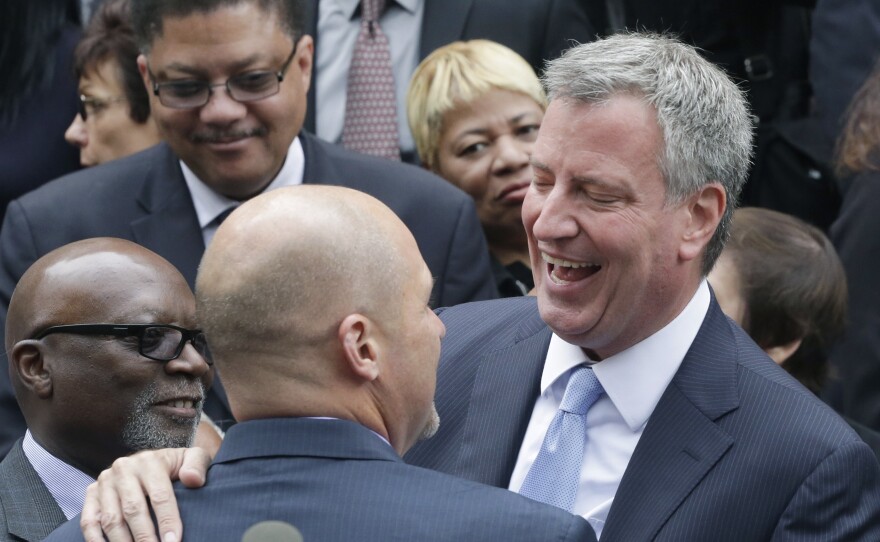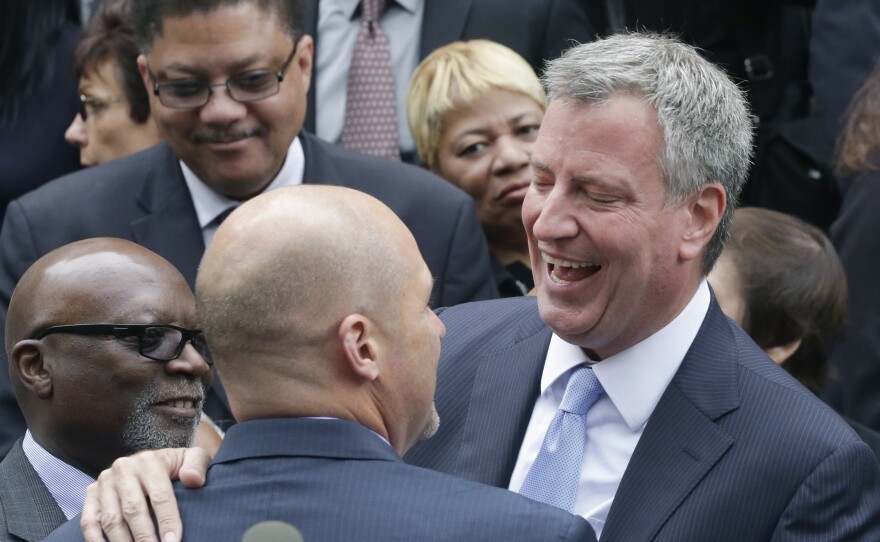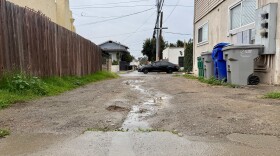

This week, the center of New York City's political universe was downtown Brooklyn.
With the dust settling from the mayoral primary, the two candidates who will be on the ballot to replace outgoing Mayor Michael Bloomberg both live in the city's biggest borough.
On Thursday, Republican candidate Joe Lhota shook hands with voters pouring out of the subway a few blocks from his home in Brooklyn Heights.
"When I first moved here 25 years ago, no one wanted to come visit me in Brooklyn," Lhota says. "Now they all live here as well. It's really symbolic, it's emblematic, of how Brooklyn is in ascendancy."
The former city transit chief was born in the Bronx and lived most of his adult life in Brooklyn. Lhota says that definitely affects how he would govern.
"It'll have a big difference," he says. "You gotta listen to the people in the boroughs. That's where most of the people are."
On the other side of the ticket, Democrat Bill de Blasio was in downtown Brooklyn Friday to accept the endorsement of another prominent Brooklyn Democrat, Sen. Chuck Schumer.
Schumer and de Blasio stood on the steps of Brooklyn's Borough Hall in front of a diverse crowd of supporters, including black, white, Latino and Asian leaders from across the city.
"This is why we are winning this campaign," de Blasio said. "Because we have every type of New Yorker working hard every day to bring about changes we need."
De Blasio, the city's public advocate, did well across New York in the primary election. But he dominated Brooklyn, winning in virtually all of the borough's neighborhoods and demographic groups.
Brooklyn may be the city's biggest borough, with 2.5 million people, but it has traditionally lagged behind Manhattan when it comes to power and prestige.
That's changing, says Carlo Scissura, president of the Brooklyn Chamber of Commerce.
"For a decade, we've been talking about how cool Brooklyn has become," Scissura says. "The artists live here, the writers live here. It was just a matter of time that the political landscape was going to shift here as well. And it has."
The city's politics have definitely changed since the last time a Brooklyn resident was elected mayor, when Abe Beam won in 1973. The neighborhoods along the East River, facing Manhattan, have boomed in the last 20 years.
But in other parts of the borough, unemployment and crime are still high -- and many New Yorkers feel left out of the city's recent prosperity, says Douglas Muzzio, who teaches public affairs at Baruch College, part of the City University of New York.
"One of the things that resonated in the de Blasio campaign is that there's inequality," he says. "And the inequality is growing. And that what we need to do as policymakers is refocus on not Manhattan, not the elites, not big business."
Two polls this week show de Blasio with a commanding 40-point lead over Lhota heading into the Nov. 5 general election. A lot of de Blasio's success may be connected to fatigue with the third term of Mayor Michael Bloomberg, a Republican turned independent.
Brenda Haggard of Fort Greene, Brooklyn, says the Bloomberg administration puts Manhattan ahead of the other boroughs.
"He didn't pay attention to Brooklyn at all, if the truth be told," Haggard says. "And he can't be out soon enough for me."
Whoever wins, Kerryann McNish of Crown Heights hopes the next mayor will be more focused on Brooklyn's concerns.
"They're from here, so they know the area," she says. "And what problems we face, definitely, like gun violence. And education. Our school system; it's failing our children."
Copyright 2013 NPR. To see more, visit www.npr.org.






